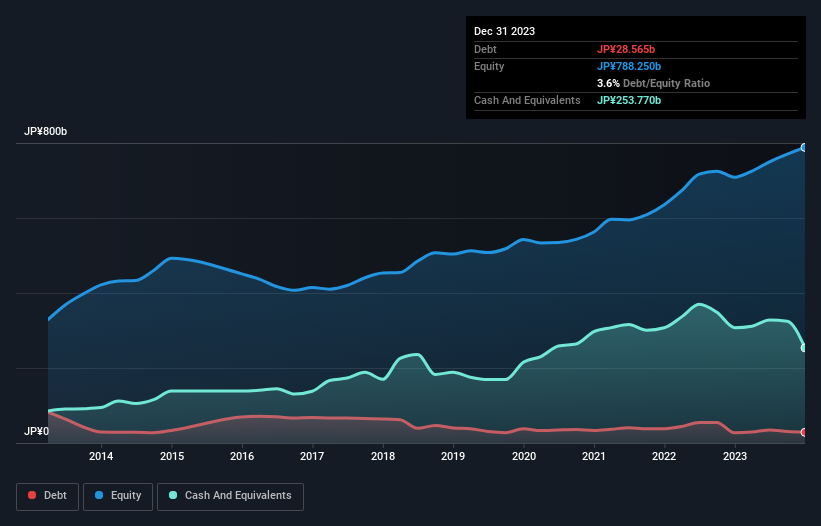
The external fund manager backed by Berkshire Hathaway's Charlie Munger, Li Lu, makes no bones about it when he says 'The biggest investment risk is not the volatility of prices, but whether you will suffer a permanent loss of capital.' When we think about how risky a company is, we always like to look at its use of debt, since debt overload can lead to ruin. Importantly, Unicharm Corporation (TSE:8113) does carry debt. But should shareholders be worried about its use of debt?
When Is Debt Dangerous?
Debt is a tool to help businesses grow, but if a business is incapable of paying off its lenders, then it exists at their mercy. Part and parcel of capitalism is the process of 'creative destruction' where failed businesses are mercilessly liquidated by their bankers. However, a more common (but still painful) scenario is that it has to raise new equity capital at a low price, thus permanently diluting shareholders. Having said that, the most common situation is where a company manages its debt reasonably well - and to its own advantage. The first step when considering a company's debt levels is to consider its cash and debt together.
See our latest analysis for Unicharm
What Is Unicharm's Net Debt?
You can click the graphic below for the historical numbers, but it shows that as of December 2023 Unicharm had JP¥28.6b of debt, an increase on JP¥27.0b, over one year. But on the other hand it also has JP¥253.8b in cash, leading to a JP¥225.2b net cash position.

A Look At Unicharm's Liabilities
We can see from the most recent balance sheet that Unicharm had liabilities of JP¥270.1b falling due within a year, and liabilities of JP¥75.3b due beyond that. Offsetting this, it had JP¥253.8b in cash and JP¥151.6b in receivables that were due within 12 months. So it can boast JP¥60.0b more liquid assets than total liabilities.
This surplus suggests that Unicharm has a conservative balance sheet, and could probably eliminate its debt without much difficulty. Succinctly put, Unicharm boasts net cash, so it's fair to say it does not have a heavy debt load!
The good news is that Unicharm has increased its EBIT by 6.9% over twelve months, which should ease any concerns about debt repayment. When analysing debt levels, the balance sheet is the obvious place to start. But ultimately the future profitability of the business will decide if Unicharm can strengthen its balance sheet over time. So if you want to see what the professionals think, you might find this free report on analyst profit forecasts to be interesting.
Finally, a business needs free cash flow to pay off debt; accounting profits just don't cut it. While Unicharm has net cash on its balance sheet, it's still worth taking a look at its ability to convert earnings before interest and tax (EBIT) to free cash flow, to help us understand how quickly it is building (or eroding) that cash balance. During the last three years, Unicharm produced sturdy free cash flow equating to 69% of its EBIT, about what we'd expect. This cold hard cash means it can reduce its debt when it wants to.
Summing Up
While we empathize with investors who find debt concerning, you should keep in mind that Unicharm has net cash of JP¥225.2b, as well as more liquid assets than liabilities. The cherry on top was that in converted 69% of that EBIT to free cash flow, bringing in JP¥124b. So is Unicharm's debt a risk? It doesn't seem so to us. Above most other metrics, we think its important to track how fast earnings per share is growing, if at all. If you've also come to that realization, you're in luck, because today you can view this interactive graph of Unicharm's earnings per share history for free.
At the end of the day, it's often better to focus on companies that are free from net debt. You can access our special list of such companies (all with a track record of profit growth). It's free.
New: AI Stock Screener & Alerts
Our new AI Stock Screener scans the market every day to uncover opportunities.
• Dividend Powerhouses (3%+ Yield)
• Undervalued Small Caps with Insider Buying
• High growth Tech and AI Companies
Or build your own from over 50 metrics.
Have feedback on this article? Concerned about the content? Get in touch with us directly. Alternatively, email editorial-team (at) simplywallst.com.
This article by Simply Wall St is general in nature. We provide commentary based on historical data and analyst forecasts only using an unbiased methodology and our articles are not intended to be financial advice. It does not constitute a recommendation to buy or sell any stock, and does not take account of your objectives, or your financial situation. We aim to bring you long-term focused analysis driven by fundamental data. Note that our analysis may not factor in the latest price-sensitive company announcements or qualitative material. Simply Wall St has no position in any stocks mentioned.
About TSE:8113
Unicharm
Engages in sale of wellness care products, pet care and feminine care products, baby and child care products, kirei care products, food-packaging materials, etc.
Flawless balance sheet, good value and pays a dividend.

